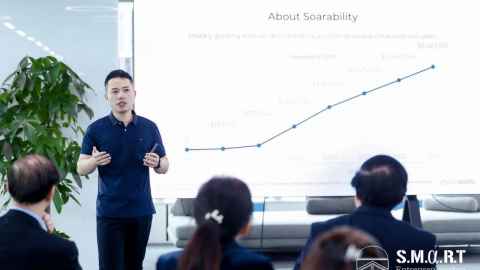Steven Shutong Jiang
When Steven Shutong Jiang was studying at the University of Auckland, his supervisor Peter Xu imparted a valuable piece of commercial advice: keep it real.

Steven was doing engineering and Peter was Professor of Mechatronics, so in such a well-grounded environment there might have seemed little danger of students drifting away. In fact, that’s literally what Steven has done launching Soarability, a business based on drones.
But since Soarability took off in 2016 – started with classmate Max Tseng, who left the company in 2018 – Steven has stuck to the commercial imperative imparted by Professor Xu in applying his engineering nous to a real-world need.
As chief executive of the company, now headquartered in Singapore while carrying out R&D and manufacturing in Shenzhen, China, Steven helps the natural gas industry detect and address leaks at each stage, from gas production to transmission and distribution.
“Our technology is trusted and recognised by prestigious companies in the natural gas sector, including industry leaders such as Aramco, which validates the impact and excellence of our work,” says Steven.
Soarability’s drone-mounted methane sensors play both a safety role and help limit greenhouse gas emissions, Steven explains. Since first becoming airborne in 2017, a succession of sensing systems, including for the detection of nuclear radiation, have been built for aerial and ground vehicles. One of those, CitySense, piggybacks on public transport and service vehicles to create a cost-effective environmental sensing network.
Associate Professor Karl Stol was another of Steven’s supervisors, drilling into him the importance of not sacrificing high standards on the throne of entrepreneurship.
“His relentless pursuit of perfection was demanding, but has been immensely beneficial,” says Steven.
He also credits his wife Jane Xu, whom he met at the University, with helping him take to the air.
“Her support and insights have profoundly shaped my personal growth and professional trajectory,” he says.
An early commercial misconception he overcame was that superior technology alone guarantees market acceptance.
“Understanding that successful innovation depends, to a great extent, on aligning technology with genuine market needs was pivotal,” Steven says.
When that lesson sunk in, it changed his business approach and boosted the value of the company’s offerings.
The University’s general engineering curriculum — particularly engineering communications and systems engineering — helped him gain that insight.
“These courses equipped me with vital skills in clear communication, systematic problem-solving and strategic thinking,” says Steven, describing them as essential for establishing a technology-driven business.
Entrepreneurship has always driven him, and developing solutions within the environmental technology sector is the fulfilment of his aspirations.
“One of my most significant professional goals is to see our methane detection technology become a global standard infrastructure for effectively reducing greenhouse gas emissions.”
He doesn’t kid himself that he’s there yet, however: “I see success as a continuous pursuit, rather than a fixed destination.”
Age is not a factor, either: “I haven’t set explicit targets tied to my age. My focus has consistently been on maintaining the right direction and meaningful progress.”
But he can see the benefit of making an early start.
“Graduating and embarking on my entrepreneurial path at a younger age has provided a distinct advantage, offering more time and flexibility to learn, grow and innovate in a competitive industry.”
And the rewards are tangible.
“The biggest of those are the meaningful results from the solutions my team and I have developed. Knowing our technology contributes directly to improving safety and environmental outcomes provides a deep sense of satisfaction and motivation.”
When asked about any particular quality he brings to the task, he comes back to the advice dished out by Professor Xu: “I think my passion for identifying and solving real-world problems sets me apart.”